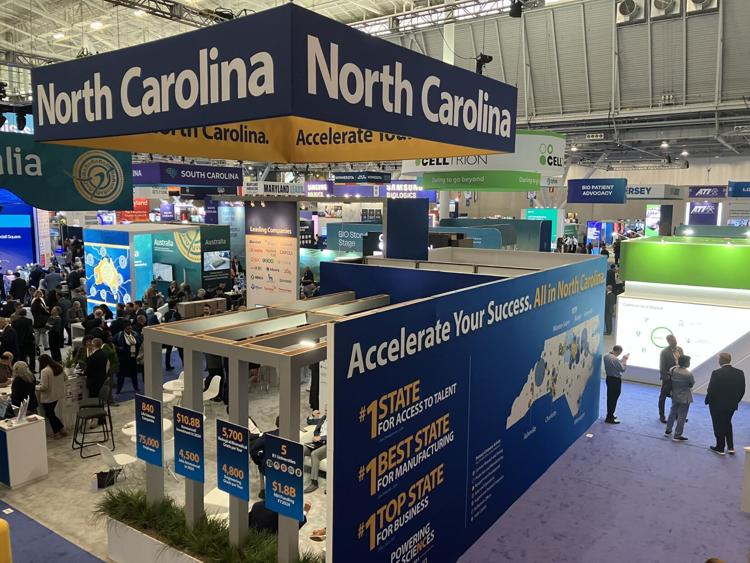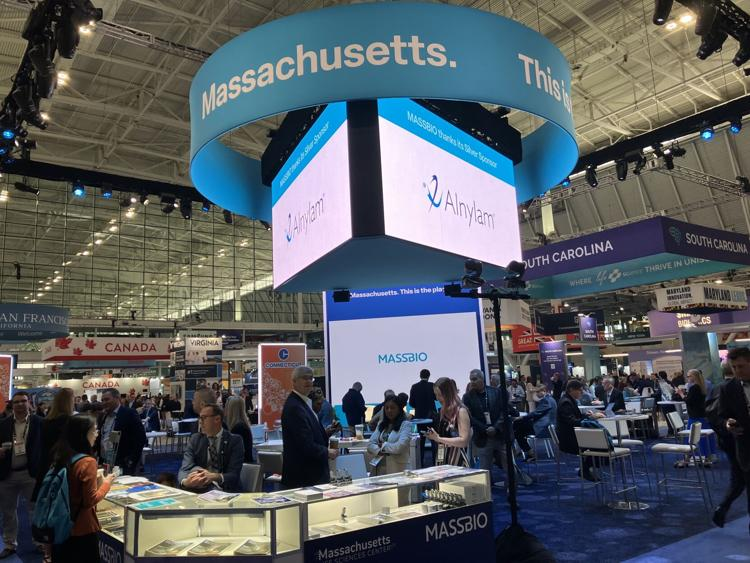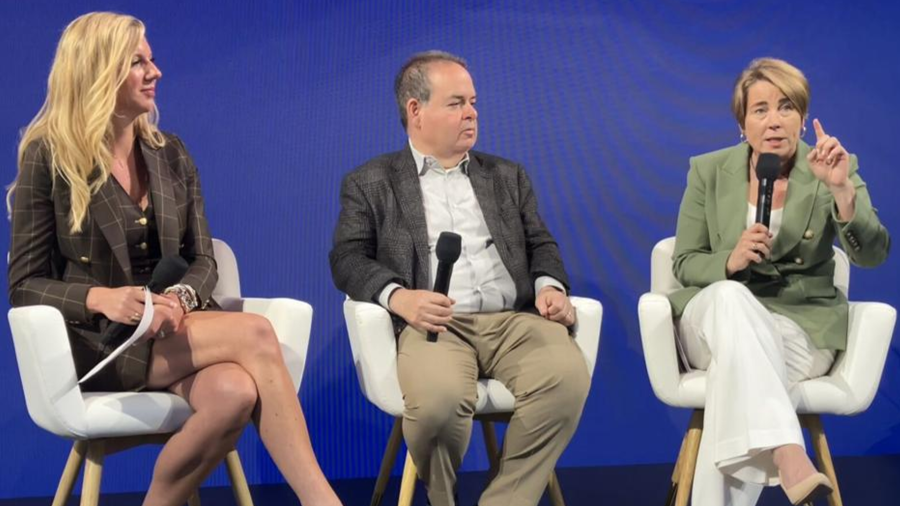BOSTON (SHNS) – Sitting at her perch from the “Massachusetts Pavilion,” Gov. Maura Healey briefly gestured Tuesday to nearby competitors with flashy booths set up at the BIO International Convention, which has drawn nearly 20,000 life sciences leaders to Boston this week.
North Carolina, South Carolina, Pennsylvania, Connecticut, New Hampshire, Australia and Canada had setups in close proximity to Massachusetts, while Texas’s booth was situated much further back in the exhibition hall.
“Trust me, you know, as governor I feel the pressure of competition every single day, and I’m looking around at other states and countries. I want us to be No. 1, and I want us to lengthen our lead,” Healey said. “That happens because we work in partnership — the conversations, the communication, the collaboration between and among our research institutions, our hospitals, our universities, our VCs and our other funders is so, so important, and that kind of communication is what makes this ecosystem so powerful.”
House Speaker Ron Mariano also sized up the competition later Tuesday, and Senate President Karen Spilka and a bevy of lawmakers swung by the large gathering at the Boston Convention and Exhibition Center.
“It’s no surprise that we’re here in Massachusetts again. The years of public investment has created a fertile ground for the growth of a really indispensable industry,” Mariano, a Quincy Democrat, said. “I’m looking at signs for Australia and all sorts of places I’ve never been to, wondering if they’re willing to follow our lead and continue to support an industry that’s changing the world.”
When BIO was last hosted in Boston, Healey in 2023 pledged
to reauthorize the life sciences initiative
. A 2024 law reauthorized public investments in the sector for another decade with a $500 million capital investment, and a boost to the annual life sciences tax incentive program. The landmark initiative began under former Gov. Deval Patrick in 2008 and officials say it’s helped secure the state’s status as a global life sciences leader.
Threats over the loss of federal research funding have spawned uncertainty for the life sciences industry. A federal judge in Boston ruled that the Trump administration’s cut to NIH research grants are “illegal” and “void,” according to Attorney General Andrea Campbell.
“I want all of you to know, I know a little something about what’s going on right now. It’s a little more challenging time in the cycle of life sciences,” Healey said. “That’s OK.”
She added, “We’ve got the human capital, OK, we’ve got the intellectual capital, we’ve got the workforce and talent.”
Employment in the state’s life sciences industry
was flat in 2024
, posting the smallest year-over-year growth in the last decade and a half, according to a report released this month from the Massachusetts Biotechnology Education Foundation.
Biopharma companies headquartered in Massachusetts secured $7.89 billion in venture capital funding last year, marking a slight increase over 2023, a MassBio report from January said. But that haul
fell significantly short
of the $13.66 billion that companies received in 2021 during the pandemic.
At BIO, some life sciences leaders and economic development professionals from across the country were eager to share how their states were finding success in the industry, including by offering lower costs of living, fewer regulatory barriers, and growing talent pipelines.

A fact sheet from the North Carolina pavilion described the state as a “global life sciences leader” that is known for biopharma manufacturing, gene and cell therapy, research and development, clinical research and agricultural technology. The state, which in the 1980s had just a handful of life sciences businesses, now boasts 840 companies.
“The first thing I generally don’t do when I’m pitching North Carolina is pitch us against Massachusetts. I am a believer that there’s enough biotech, and we’re different enough,” said William Bullock, senior vice president of economic and statewide development at the North Carolina Biotechnology Center nonprofit.
“We’ve really leaned into biomanufacturing, so that’s an area that we put a lot of investment in, particularly on the workforce development side,” Bullock continued. “So we’ve got a very connected pathway, really from K-12 through our community colleges, into our universities, and out into the community.”
He pointed to Eli Lilly and Company, which last August opened a research and development center in Boston’s Seaport area, intended to be a hub for genetic medicines. The company also has two “massive” manufacturing facilities in North Carolina, Bullock said.
Novo Nordisk also recently built a research and development hub in Lexington, while also investing $6 billion into manufacturing efforts in North Carolina, Bullock said.
“As you start migrating more into development and manufacturing, the workforce parameters change a little bit — the business parameters change a little bit in terms of what you want to have in the community, ” Bullock said. “North Carolina has a lot of it on the manufacturing side, so business climate-wise, tax-wise and then workforce development-wise.”
In Texas, the biotech landscape in the Dallas-Forth Worth region is experiencing rapid growth, particularly at the 26-acre life sciences campus known as Pegasus Park.
The campus features BioLabs incubator facilities — part of a global network of shared office and lab space — as well as the 135,000-square-foot Bridge Labs space for companies that are new to the region or have outgrown incubators, said Gabby Everett, director of business operations and strategy at BioLabs Pegasus Park.
The campus is also home to a customer experience hub for the Advanced Research Projects Agency for Health that’s focused on developing “accessible health solutions,”
according to Dallas city officials
. Massachusetts has the “investor catalyst hub” through ARPA-H.
“There’s a lot of appetite for biotech in north Texas,” Everett said. “For Pegasus Park, it’s the community of innovators that we are creating. There’s innovators, there’s investors, there’s consultants. We have accelerators.”
At BioLabs in Dallas, facility costs and other expenses are about half the price of other regions, she said.
“I’m not going to throw Boston BioLabs under the bench, but incubators in Boston are expensive. In San Francisco, in San Diego, they’re expensive,” Everett said. “You can double your runway if you start your company or bring your company to north Texas.”

Back in Massachusetts, local officials in Marlborough have helped cultivate a life sciences hub with major companies, including Boston Scientific, Quest Diagnostics, Cytiva, Hologic and Sartorius.
Meredith Harris, executive director of the Marlborough Economic Development Corporation, said the city offers a more affordable option for lab and manufacturing space outside of Greater Boston. She also highlighted a life sciences workforce development program for high school students, which Harris said is strengthening the local talent pipeline.
Harris said the latest state investment in the LSI, plus expanded tax credits, represent important tools for communities to attract more companies. But asked how Massachusetts compares to competitor states, she said, “Honestly, the other states sometimes are more competitive when it comes to economic development.”
“They put a lot of dollars behind their economic development efforts,” Harris continued. “I think what Massachusetts has that a lot of those other states don’t have is we have the academia right here. So if you’re looking for that talent, you don’t have to look very far when you’re in Massachusetts to find the best and brightest that are coming out of Harvard University, and MIT and WPI, all these different schools that are not just in Boston, but also in the Worcester area, as well.”
Local News Headlines
Mass. pols blend in at global life sciences mixer
Cedar Chest and Grow Food Northampton team up to fight hunger with “Give $10, Get $10” promotion
Cell phones in schools compared to “electronic cocaine”
Springfield solar project highlights $50 million statewide initiative to cut energy costs
WWLP-22News, an NBC affiliate, began broadcasting in March 1953 to provide local news, network, syndicated, and local programming to western Massachusetts. Watch the
22News Digital Edition
weekdays at 4 p.m. on WWLP.com.
Copyright 2025 Nexstar Media, Inc. All rights reserved. This material may not be published, broadcast, rewritten, or redistributed.
For the latest news, weather, sports, and streaming video, head to WWLP.







